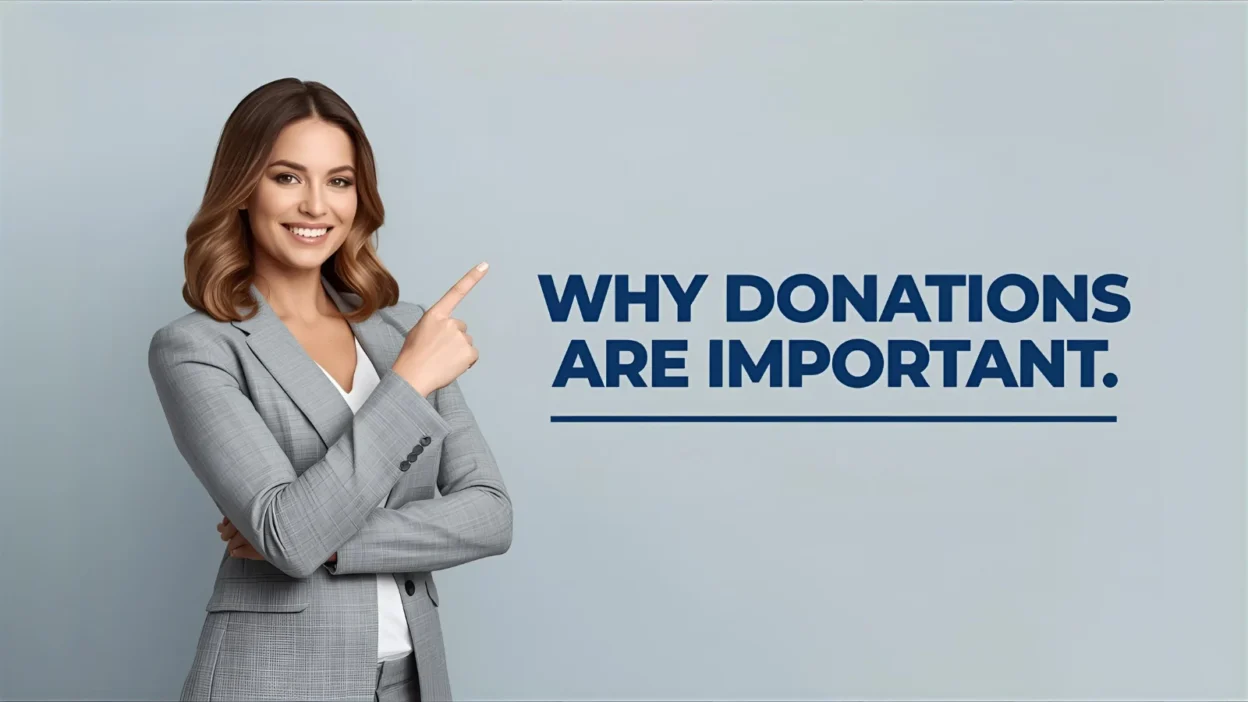Donations are more than just money or goods handed over—they’re acts of kindness that ripple far beyond the giver and receiver. Whether it’s contributing to a local shelter, funding medical research, or donating clothes to disaster victims, giving makes societies stronger and individuals more compassionate.
This article explores why donations are important, how they impact communities, donors, and the world, and why generosity is a value that should never be underestimated.
Understanding Donations
📌 Definition:
A donation is the voluntary act of giving money, goods, time, or effort to support a cause, individual, or organization without expecting anything in return.
👉 Donations can be financial, material, or service-based—and they play a vital role in creating balance in society.
Reasons Why Donations Are Important
- Support communities – provide food, shelter, and education.
- Save lives – fund medical treatments and emergency relief.
- Promote equality – bridge the gap between the privileged and underprivileged.
- Encourage empathy – nurture compassion in society.
- Strengthen charities – fuel organizations that work for change.
- Boost mental well-being – giving brings happiness to the donor.
- Create social responsibility – makes people accountable to their community.
- Foster unity – donations bring people together for a shared cause.
- Encourage gratitude – donors appreciate their own blessings.
- Inspire future giving – generosity is contagious.
Donations in Everyday Life
We encounter opportunities to donate more often than we realize:
- Dropping spare coins into charity boxes.
- Blood donations at hospitals.
- Time and skills volunteered for community projects.
- Donating books and clothes to schools or shelters.
- Supporting online fundraisers for medical needs or education.
💡 Example: A small donation of school supplies can transform a child’s learning experience.
The Psychology of Donations
Giving doesn’t just benefit others—it transforms the giver too:
- Releases endorphins – known as the “helper’s high.”
- Reduces stress – generosity boosts positive emotions.
- Builds purpose – giving creates meaning in life.
- Enhances self-worth – donors feel valuable in society.
- Improves relationships – shared generosity bonds communities.
📖 As Winston Churchill said, “We make a living by what we get, but we make a life by what we give.”
Types of Donations
- Monetary donations – financial aid to charities or individuals.
- Material donations – clothes, food, books, or equipment.
- Blood and organ donations – life-saving contributions.
- Time donations – volunteering and community service.
- Skill-based donations – teaching, mentoring, or offering expertise.
- Corporate donations – businesses supporting social causes.
Idioms Related to Giving
- “Give with an open hand” – to give generously.
- “Charity begins at home” – kindness should start within one’s family or community.
- “Hand to mouth” – living with just enough, highlighting why donations matter.
- “Extend a helping hand” – to support someone in need.
- “A drop in the ocean” – a small donation compared to a big need.
Synonyms for Donation
| Synonym | Usage Example |
|---|---|
| Contribution | Her contribution helped fund the school library. |
| Gift | The charity received a generous gift. |
| Offering | Villagers made an offering to support the temple. |
| Endowment | The university received a large endowment. |
| Grant | He applied for a grant to continue his research. |
Grammar Note: Donation in Sentences
- Noun (singular) – The donation was greatly appreciated.
- Noun (plural) – The donations helped rebuild the community.
- Verb form – She donates to children’s hospitals regularly.
- Adjective form – The donation drive collected winter clothes.
👉 Remember: Donate is the verb, donation is the noun.
Real-Life Examples of Donations’ Impact
- Blood donation drives – save millions of lives annually.
- Disaster relief funds – rebuild communities after earthquakes or floods.
- Educational charities – provide scholarships and resources for students.
- Food banks – feed families struggling with poverty.
- Corporate donations – companies like Microsoft and Google fund global health and education projects.
Donations and Society
Donations are pillars of strong societies:
- Fight poverty – support vulnerable groups.
- Promote education – scholarships and books open doors.
- Advance healthcare – medical research depends on donations.
- Encourage cultural growth – funding art and museums.
- Support sustainability – donations fund environmental projects.
🌍 A society where people give back is one that thrives in compassion and resilience.
Challenges in Donations
- Lack of trust in some organizations.
- Donor fatigue due to constant appeals.
- Misuse of donated funds.
- Limited awareness about genuine causes.
- Inequality in global donation distribution.
⚡ Solution: Transparency, accountability, and promoting a culture of mindful giving are key.
The Future of Donations
Donations are adapting with modern needs:
- Digital donations – quick online giving.
- Crowdfunding platforms – support individual projects worldwide.
- Cryptocurrency donations – blockchain-based giving.
- Sustainable giving – eco-friendly and social enterprises.
- Global movements – youth-led donation drives via social media.
🚀 Donations in the future will be more connected, transparent, and impactful.
FAQs About Donations
Q1: Why are donations important in society?
They support vulnerable groups, strengthen communities, and promote equality.
Q2: Do small donations really matter?
Yes—even small contributions create significant impact when combined.
Q3: Why do donations make people feel happy?
Because giving triggers positive emotions and a sense of purpose.
Q4: Are donations only about money?
No—they include time, skills, blood, and materials.
Q5: How do donations impact education?
They fund scholarships, resources, and opportunities for students.
Conclusion
Donations are not just about money—they’re about compassion, responsibility, and community. They save lives, build stronger societies, and give donors a sense of purpose. From supporting disaster victims to funding education, every donation carries the power to change lives.
The strongest reason donations are important? Because they remind us that giving unites us all in humanity.

Joy Root is a content writer at Whygenix.com, creating clear, engaging articles that explain complex ideas simply, helping readers understand why topics matter in everyday life and personal growth.




